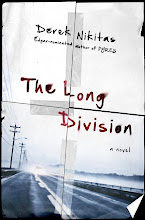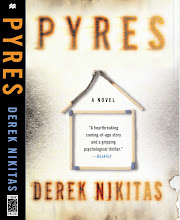A favorite sentence of fictional prose? Sure, I said, I can deliver. I didn’t mean to be cheeky, stretch the definition of “sentence.” It’s just that this sentence gave me a vision of literary godhood. It’s from the point of view of a bunch of ragged cowboys who have noticed a band of Comanches coming toward them from the distance. These cowboys (land pirates, really) are about meet near-total annihilation:
A legion of horribles, hundreds in number, half naked or clad in costumes attic or biblical or wardrobed out of a fevered dream with the skins of animals and silk finery and pieces of uniform still tracked with the blood of prior owners, coats of slain dragoons, frogged and braided cavalry jackets, one in a stovepipe hat and one with an umbrella and one in white stockings and a bloodstained weddingveil and some in headgear of cranefeathers or rawhide helmets that bore the horns of bull or buffalo and one in a pigeontailed coat worn backwards and otherwise naked and one in the armor of a spanish conquistador, the breastplate and pauldrons deeply dented with old blows of mace or saber done in another country by men whose very bones were dust and many with their braids spliced up with the hair of other beasts until they trailed upon the ground and their horses’ ears and tails worked with bits of brightly colored cloth and one whose horse’s whole head was painted crimson red and all the horsemen’s faces gaudy and grotesque with daubings like a company of mounted clowns, death hilarious, all howling in a barbarous tongue and riding down upon them like a horde from a hell more horrible yet than the brimstone land of Christian reckoning, screeching and yammering and clothed in smoke like those vaporous beings in regions beyond right knowing where the eye wanders and the lip jerks and drools.
One could spend a whole career aspiring to such a sentence. It comes 53 pages into Cormac McCarthy’s Blood Meridian. Not that there aren't hundreds of brilliant sentences before this one, but this, I remember, was the sentence that got me. To paraphrases Denis Johnson in Jesus’ Son (a collection of stories that by itself provides about a dozen of my other favorite sentences): I’ve gone looking for that sentence everywhere.
You gotta be careful with McCarthy, though. He’s addicting for writers. His cadences will get into your blood and soon enough you find yourself inverting word order, tossing around biblical-sounding archaism and making lots of metaphors about hell and other- dimensional demons. You’ll not punctuate dialogue, you’ll smash hyphenates into compounds with abandon, and you’ll not translate spanish (which you will spell without a cap because, well, you’re reckless like that). I can’t read McCarthy within a couple days of writing my own stuff because of how he possesses me. And my version of McCarthy is a sad karaoke indeed.
What I love about him, though, is that he’s not self-parodist. Yes, The Road is similar to Blood Meridian in content; hard to tell the difference between McCarthy’s Southwest and his post-Apocalyptic South. But the prose in The Road is much more subdued, simplified, and personal than what you have here.
I love both books for very different reasons, Blood Meridian for its epic breadth and endlessly original imagery and The Road for its relentlessly gut-wrenching sentiment. I don’t think I’ve cared more deeply for two fictional people than I have for The Road’s father and son. Maybe having a son getting up to that age helps me relate. But I didn’t care one whit for anybody in Blood Meridian. They were all devils. Just goes to show—like Aristotle said—it ain’t always about character. Unless you mean The Judge. Now he’s a character.
I’m not alone here. Lots of people like McCarthy. Some can’t get into his language and I respect that concern, though I’m saddened by it. I just want to say: try harder, brother, you’ll be rewarded. But people are hardly ever specific about why they love stuff. To remedy that, here’s why I love the sentence I quoted above:
1. It manages to mimic what cameras do in film. In this particular passage, sentence length is like shot duration (not always true, but true in this case). This isn’t a series of close-up cuts of individual Comanches; it’s a sweeping panoramic of their approach, a bird’s eye view that nonetheless takes in a load of specific detail. It shows us the full spread of the danger this band poses, a long gasp of horror without a catch of breath.
2. Although the passage renders the traditional Western trope of the “imminent Indian attack,” the imagery is startlingly fresh. No war paint, few feathers, no chaps. Just a moving junkyard of materials stolen from the slaughtered over what seems like centuries. Some of the imagery is simultaneously comic and horrific, like the male Comanche wearing the “bloodstained weddingveil;” he’s in drag and he’s probably responsible for the ruthless killing of a bride on her wedding day. Part of the comedy arises from the juxtaposition of domestic items (an umbrella) and this warpath trope, but this is also the very source of the horror. It’s the perversion of the domestic and heroic that haunts.
It’s as if they’re a wave of garbage picking up the detritus of everything they’ve ever destroyed. I mean, the conquistador armor must go back centuries, so these crazy people have been passing down their war spoils for centuries. And of course the implication: if they killed conquistadors, what chance do we have? This is partly what people mean, I suppose, when they talk about how McCarthy wrote a “revisionist” Western. I don’t even know if his vision is more historically accurate than the John Wayne version, but it’s sure as hell made to seem real.
3. And yet, the stark realism of its imagery is offset by the myth-making power of its metaphors. This is where McCarthy goes beyond what the camera can do. He gives us the panoramic sweep of space, but he also give us the sweep of time and even dimension, giving us flashes of slaughters years or even centuries past. Just look at how “done in another country by men whose very bones were dust” careens us through time and space before circling us back to continue the description of the present image without even a comma to help us get our bearings. We’re being tossed around helplessly here.
Then there are the extended metaphors of hell and “those vaporous beings in regions beyond right knowing,” whatever that is. Some awful other-dimensional place. McCarthy borders on corny Gothicism here, especially with the “where the eye wanders and where the lip jerks and drools” part, but he gets away with it because of the loftiness of the image and the tone. Not to mention: it’s a good description of how this reader feels after reading this sentence. And how the viewpoint characters feel watching this murderous band approach. This interplay of stark realism and mythical metaphor allows the Comanches to have menace on two (or more) levels.
4. I could go on forever about language, though most of McCarthy’s techniques are meant to elevate what we “see” to the level of the epic, quite appropriate for his content. Were he to do this with a small-scale, intimate story, he’d be on the wrong track, which is exactly why he backs off from such extravagance in The Road.
It’s perhaps his inversions and neologisms that have the most power. “Legion of horribles” is pretty abstract, but the unique use of “horrible” as a plural noun punctuates the strangeness that is to come. “Attic” is of course a noun, used here as an adjective. Apparently, the adjectival form of “attic” means “pertaining to Greece or Athens,” which fits with the “or biblical” part for epic scope, but one also gets the more mundane sense of attic, as if these Comanches had raided somebody’s attic for old clothes and are now wearing them like a sick pantomime.
And that’s just one word, folks. To outline all the effects would take pages, proof positive that Mr. McCarthy understands the concept of density—one of the most difficult techniques to teach students. Really, you can only teach it by showing examples. And then you pray that you yourself can ever manage to do it.
To modify a comment of Nabokov’s, you can call these “portmanteau” sentences because you, the reader, will be unpacking each one of them for hours. When density works, the depth and breadth of a sentence’s many meanings hit the reader like a potpourri of smells. The reader doesn’t have to consciously get all the meanings to sense the scope, the array of possibilities waiting inside the packaging. It’s something you generally only notice with great poetry, so when novelists manage it (lowly, Poe-despised novelists), you’ve got a rare gem indeed. Hell, density is rare for all writers, poets and prosets alike. This kind of genius makes me want to weep. Out of joy or despair? Couldn’t tell you.


